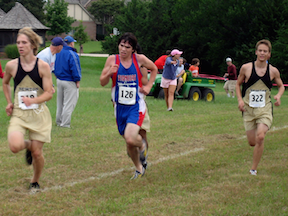The Real Poop


The Real Poop
While this may come as a shock to the average human being, there are people out there who love running. Crazier still, there are people who love running for extended periods of time. If you're one of them, cross-country is your sport.
Cue the Chariots of Fire Theme.

You might be wondering: what does it take to run cross-country at the college level? We'd like to believe that all you need is a little spandex, the body of an antelope, an impressive cardiovascular system, and, well, a lot of drive. The reality is a bit more complicated.
First of all, how fast are you? And we mean fast for a long time, not just down the football field. Are you faster than a speeding bullet or faster than a speeding manatee? Can you run a zippy 5K and start catching your second wind near the finish line?
Men who run the 5K in under 16:10 and women who run it in under 20:15 may be looking at a scholarship to a Division-I program (source). And the winners of individual meets are often a lot faster...like Oregon's Edward Cheserek with a time of 13:18 (source). (Whoa, right?)
There are hundreds of Division II and III programs for other runners to call home. If you're an aspiring NCAA cross-country runner, your options will depend on your track record (ha) and your level of commitment to the sport. For those of you who love to run but don't dream of an NCAA title, many colleges also have a club team.
Now, back to the hardcore stuff. Cross-country running is an "equivalency sport," meaning that the program has a set amount of scholarship money that gets divided between all team members. "Head-count sports," like football, limit the number of student-athlete scholarships, but any individual athlete can get a full ride (source).
The bottom line of these formal rules? Most college runners earn only partial scholarships. Plus, the scholarship money for the cross-country team is usually shared with the track and field team…which means even less money for you as an individual athlete.
We have to stress, too, that even if you are able to score some kind of scholarship to a Div-I team, you have to be willing to work hard to improve your times. No matter how fast you run coming into college, you are expected to get a lot faster. It's obvious, we know. But true. Better don those sneakers, grab your digital watch, and get runnin'.
You will also have to stay healthy in as many ways as possible. Eat well and often. Sleep whenever and wherever possible. (Yes, catching some z's on the bus between classes is a good idea; no, you probably shouldn't attempt to nap en route to your next class if you have to walk there.) Oh, and you better take a good, long look at any, er, protein supplements, or other substances that might fall into your hands.
You'll have to be you prepared to hit the books as well. It goes without saying (but we're going to say it anyway) that you can't run cross-country in college if you don't get into college. It also goes without saying that you can't run cross-country in college if you flunk out.
In fact, all NCAA athletes have to maintain a certain academic standard in order to compete. As a cross-country runner with only a partial scholarship, you've got an even bigger incentive to keep up with your schoolwork: eating after graduation.
You need money to do things, right? Not only to eat mac and cheese, but also to have a place to live and other such trivial matters? Well, if you grow up to be one of the top 10 professional marathoners in the world, you might be able to bring home over $400,000 per year. Otherwise, you'll make maybe $15,000 per year...or, you know, absolutely nothing (source).

Ramen noodles may be able to keep you alive for three to four years, but after that you may want some protein. (Source)
Remember the TV commercial for the NCAA about how most student-athletes will be going pro in something other than sports? We're not going to kid you: unless you're a top athlete at one of the best D-I programs in one of the most competitive crop of runners your school has had in a few years, you're probably going pro in something other than running.
And if you have no cash, how could you possibly buy your very own shorter-than-short shorts? Our friends over at Shmoop Math tell us that there is a proven statistical correlation between shorter shorts and faster times. At least that's what it seems like. And even if you don't get any faster, your thighs will get a great tan. Added bonus: everyone will get to see your amazing quads. You earned 'em. You can flaunt 'em.
So, dear Shmoopers, please don't aim to run NCAA cross-country unless you really, really, really love running and, um, are actually pretty good at it. (We love to play foosball, but also realize that most of us are absolutely terrible at it.) Were you born to run like Forrest Gump, Lynn Jennings, and, of course, Bruce Springsteen? Are you obsessed with the famed "runner's high," like Colin Smith? Did you grow up listening to your parents blab about Steve Prefontaine?
If you answered "yes" to all of these questions, then you might have a career in NCAA cross-country.
If it is your passion to run and you want to do it at the collegiate level, we're here to help...mostly by slapping you on the back after you're done with your arduous sweat-fest. While you and your ilk outrun the upcoming zombie apocalypse, we at Shmoop will be sitting right here, exercising our brains until steam comes out of our ears.